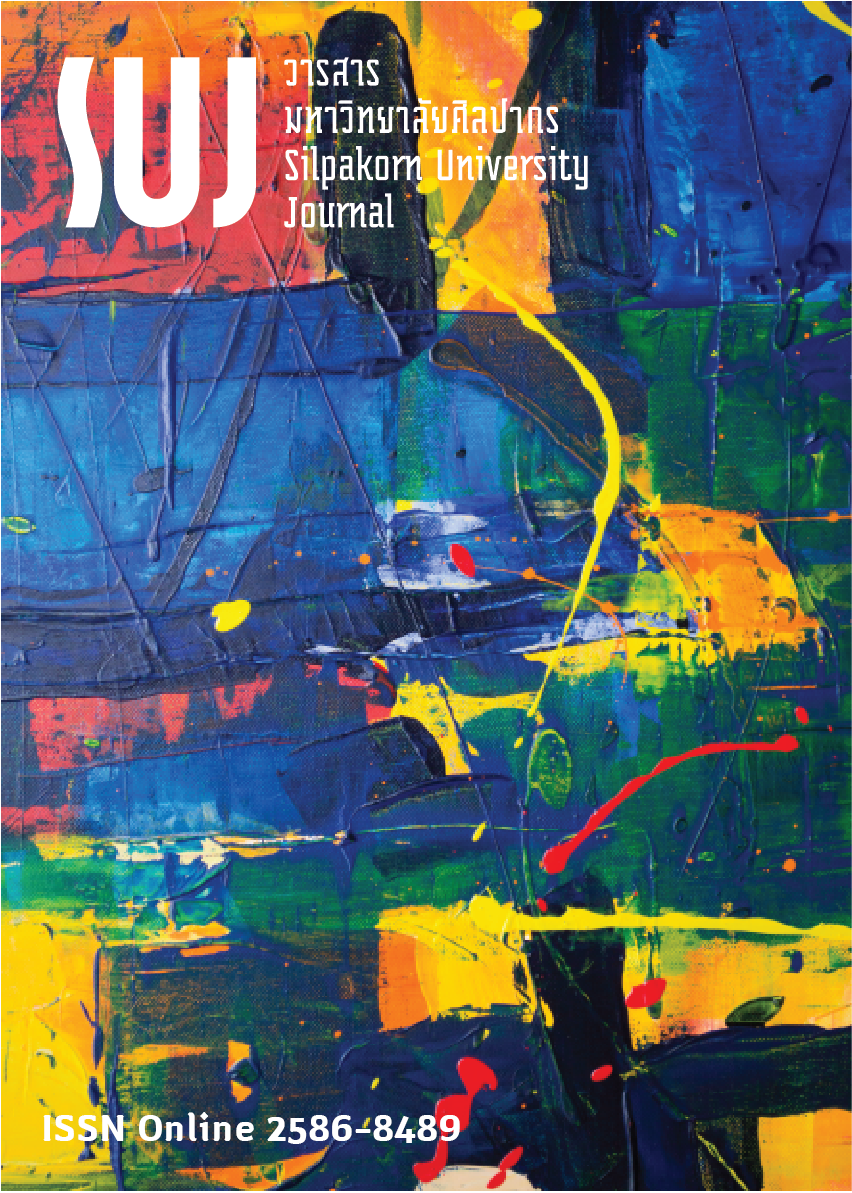อิทธิพลของรูปแบบการเรียนรู้ต่อผลสัมฤทธิ์ทางการเรียนของนักศึกษาแพทย์แผนไทย โดยมีความสุขในการเรียนเป็นตัวแปรคั่นกลาง (Effect of learning style to academic achievement for Thai Traditional Medical Students by happiness learning as a mediator)
Main Article Content
Abstract
การวิจัยนี้มีวัตถุประสงค์เพื่อศึกษาและตรวจสอบความสอดคล้องของโมเดลอิทธิพลของรูปแบบการเรียนรู้ที่ส่งผลต่อผลสัมฤทธิ์ทางการเรียนของนักศึกษาแพทย์แผนไทยโดยมีความสุขในการเรียนเป็นตัวแปรคั่นกลาง กลุ่มตัวอย่างเป็นนักศึกษาแพทย์แผนไทยและนักศึกษาแพทย์แผนไทยประยุกต์ จำนวน 240 คน เครื่องมือที่ใช้เป็นแบบสอบถามชนิดมาตรประมาณค่า 5 ระดับ ตัวแปรที่ศึกษา ประกอบด้วย ผลสัมฤทธิ์ทางการเรียนความสุขในการเรียน และรูปแบบการเรียนรู้ 6 รูปแบบ ได้แก่ รูปแบบความรักและศรัทธา การเห็นคุณค่า การเรียนรู้ การเปิดประตูสู่ธรรมชาติ ความมุ่งมาดและมั่นคง การดำรงรักษ์ไมตรีจิต และการใช้ชีวิตที่สมดุล วิเคราะห์ข้อมูลด้วยเทคนิคการวิเคราะห์เส้นทาง โดยใช้โปรแกรม LISREL ผลการวิจัยปรากฏว่า รูปแบบการเรียนรู้ ที่ส่งผลต่อผลสัมฤทธิ์ทางการเรียนของนักศึกษาแพทย์แผนไทยโดยมีความสุขในการเรียนเป็นตัวแปรคั่นกลางอย่างมีนัยสำคัญทางสถิติ มี 2 รูปแบบ ได้แก่ รูปแบบการเรียนรู้ด้วยความรักและศรัทธา และการเรียนรู้ด้วยความมุ่งมาดและมั่นคง (Chi-Square = 2.800 df = 2 p = .247 RMR = .005 SRMR = .027 GFI = .994 NFI = .988 NNFI = .989) และสามารถเขียนเป็นสมการทำนายได้ ดังนี้
สมการที่ 1 ZHappyL = .355*ZLoveF + .173*ZStriveS , R2 = .210
สมการที่ 2 ZGradeA = .623*ZHappyL , R2 = .388
This research aimed to study and validate the effect of learning style on academic achievement for Thai traditional medical students by using happiness learning as a mediator among 240 Thai traditional medical students.The data were collected by using a set of questionnaires with the Likert scale. The independent variables were academic achievement, happiness learning, and six learning styles, including love and faith, appreciation, self-learning, desire and stability, goodwill, and life balance. Path Analysis techniques were applied by LISREL Program.The results revealed that there were two learning styles that have an effect on Thai traditional medical students’ academic achievement by using happiness learning as a mediator with statistical significance, including the learning styles of love and faith, and desire and stability. (Chi-Square = 2.800 df = 2 p = .247 RMR = .005 SRMR = .027 GFI = .994 NFI = .988 NNFI = .989) Therefore, the predict equations were as follows:
Equation 1 ZHappyL = .355*ZLoveF + .173*ZStriveS , R2 = .210
Equation 2 ZGradeA = .623*ZHappyL , R2 = .388
Downloads
Article Details

This work is licensed under a Creative Commons Attribution-NonCommercial-NoDerivatives 4.0 International License.
References
Bundasak, Thanapol., Chaowiang, Kanok-on., & Jangasem, Narumol. (2017). Happily Learning among Nursing Students (ความสุขในการเรียนรู้ของนักศึกษาพยาบาล). Journal of MCU Peace Studies, 5(1): 357-369.
Bunsue, Kitiyawadee., Sutthasarn, Pitinan., Chungsookvanich, Soonthorn., & Tuntulphong, Whipar. (1997). Happiness Learning Theory (ทฤษฎีการเรียนรู้อย่างมีความสุข). Bangkok: Idea Square.
Choombuathong, Anchalee., Dhongyooyen, Pichaya., Vanitkun, Nattapat., Noinart, Chaiya., Jantasangand, Sakchai., & Suksawang, Poonpong. (2016). The Relations between Self-Esteem and Self-Regulated in Learning of the Health Science Students at Huachiew Chalermprakiet University (ความสัมพันธ์ระหว่างความมีคุณค่าในตนเองกับการควบคุมตนเองในการเรียนของนักศึกษาด้านวิทยาศาสตร์สุขภาพ มหาวิทยาลัยหัวเฉียวเฉลิมพระเกียรติ). Silpakorn University Journal, 36(1): 81-93.
Hair, J. F., Black, W. C., Babin, B. J., Anderson, R. E., & Tatham, R. L. (2014). Multivariate Data Analysis. Upper Saddle River, NJ: Pearson Prentice Hall.
Likert, R. A. (1932). Technique for the Measurement of Attitude. Archives Psychological, 3(1): 42-44.
Office of the National Primary Education Commission Ministry of Education. (1998). Inspiration of Learning Process reform (จุดประกายการปฏิรูปกระบวนการเรียนรู้). Bangkok: Idea Square Printing Factory.
Pimchoo, Punyanuch. (2016). A Structural Equation Model of Educational Achievement, Emotional Quotient and Accreditation Part I Examination of 3rd Year Medical of Undergraduate Students, Faculty of Medicine Siriraj Hospital, Mahidol University (การวิเคราะห์โมเดลสมการโครงสร้างเชาวน์อารมณ์ ผลสัมฤทธิ์ทางการศึกษาและความรู้ทางวิทยาศาสตร์การแพทย์พื้นฐานของนักศึกษาแพทย์). Siriraj Medical Bulletin, 9(1): 1-9.
Pornsiriphong, Saowapa., & Usuparat, Pornthip. (2000). Problems and Guidelines for The Development of Thai Traditional Medical Practitioner (สภาพปัญหาและแนวทางการพัฒนาการผลิตบุคลากรแพทย์แผนไทย). Nakhon Pathom: Institute for Language and Culture Research for Rural Development, Mahidol University.
Sabaiying, Wallapha. (2016). Psychology for Life (จิตวิทยาเพื่อการดำรงชีวิต). Nonthaburi: Sukhothai Thammathirat Open University.
Schumacker, R. E., & Lomax, R. G. (2016). A Beginner’s Guide to Structural Equation Modelling (4th ed.). New York: Taylor & Francis.
Suksawang, Poonpong. (2014). The Basics of Structural Equation Modeling (หลักการวิเคราะห์โมเดลสมการโครงสร้าง). Princess of Naradhiwas University Journal, 6(2): 136-145.
Thongsom, Pattama. (2014). The Development of Indicators of Happiness in Learning of students in Nursing Science Undergraduate Program under The Ministry of Public Health (การพัฒนาดัชนีชี้วัดความสุขในการเรียนของนักศึกษาหลักสูตรพยาบาลศาสตรบัณฑิต สังกัดกระทรวงสาธารณสุข). Journal of Nursing and Education, 4(1): 88-110.
Wiboolsuk, Sucheera., & Bunsawat, Nittayaporn. (2015). Factors Affecting Learning with Happiness of Medical Students in Preclinical Year (ปัจจัยที่ส่งผลต่อการเรียนรู้อย่างมีความสุขของนักศึกษาแพทย์ระดับชั้นปรีคลินิก). Siriraj Medical Bulletin, 8(2): 70-76.


